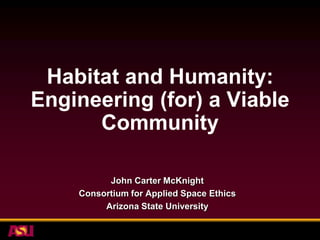
Habitat and Humanity; Engineering (for) a Viable Community: EU Science: Global Challenges, Global Opportunity
- 1. Habitat and Humanity: Engineering (for) a Viable Community John Carter McKnight Consortium for Applied Space Ethics Arizona State University
- 2. “technology is not good, nor bad. neither is is neutral.” - Melvin Kranzberg
- 3. “the street finds its own uses” – William Gibson
- 4. “inherently political artifacts” - Langdon Winner
- 5. “airlock despotism” “The parallel between the Martian frontier and that of 19th century America as technology drivers is, if anything, vastly understated.” -Robert Zubrin
- 6. “’my rockets go up, I don’t care where they come down – that’s not my department,’ says Wernher von Braun” - Tom Lehrer
- 7. “with great power comes great responsibility” - Spider-Man
- 8. John Carter McKnight, JD Lincoln Fellow of Applied Ethics Chair, Consortium for Applied Space Ethics Arizona State University john.mcknight@asu.edu johncartermcknight.com www.ethicsinspace.org
Editor's Notes
- Good afternoon, everyone. This is a technical track, but I want to address our engineers – and our policy and political experts – to urge you to recognize that technological innovation doesn’t stop with the hardware, and it doesn’t stop when the product’s released.
- (pause) Technological systems are part of human social and political systems. The people who use those systems, the people who maintain them, and those who teach the people who maintain them – are all part of the innovation cycle. That means engineers have a duty to consider the whole system in design, and to recognize a responsibility for the social and political consequences of their work.
- (pause)all systems design affects people. And people transform their systems. Complex systems generate emergent, often unintended, consequences, sometimes even the exact opposite of designer intent!
- Langdon Winner claims that (at least some) technology is inherently political: certain technologies are democratic, others autocratic, by their very nature. That means that, regardless of the intent behind their invention or deployment, they have concrete social consequences. You might argue that we know about systems for extreme environments - submarines, spacecraft, remote outposts, where we have 50, 60 years of solid experience but those systems are designed for particular kinds of users – often military or quasi-military, where the users’ social systems and their technological systems fit together and shape each other Buttourists, industrial workers and homesteaders in space pose challenges for technical systems designed for strict hierarchy and command-and-control. This means that if we want justice and democracy in space, we need to engineer it – not just into our laws, but into our technical systems.There’s been some recognition of this, but primarily from certain American engineers, either libertarians or American exceptionalists, who see in space technology a chance to build new worlds in their own image. If there are other perspectives, they must be argued for – and systems design itself is a kind of argument.
- For example, a movement grew up around Gerard O’Neill’s concepts for giant space habitats at the Lagrange points, which saw these and other closed environments as potential libertarian paradises and social laboratories.Others, though, argued that closed environments are inherently political, that they tend to strict command and control systems, and away from freedom and experimentation.Robert Zubrin of the Mars Society is one of many Americans who argue for a Manifest Destiny in space, explicitly drawing on images from the growth of American empire and seeking to recreate that process on other worlds. He argues that the technologies of Mars – smaller scale, cheaper, able to use local resources, tend towards freedom in a way that 10,000 person space cans don’t.Both acknowledge, indeed advocate for, the social and political consequences of space hardware design.
- (pause) So when we think about humans in space, we tend to start with hardware. Or we start with ideology. Some people recognize that hardware can express ideology. But what we need to keep a careful eye on is what ideology is expressed by hardware whose designers don’t think they’re expressing ideology. Because it’s there. And there’s no guarantee at all that the technical systems we want and the social systems we want are compatible with each other – or with our values.
- (pause)As we build a human future beyond our own planet, all of us are obligated to consider just what it is we want to build –hardware and human.
- Thank you.
